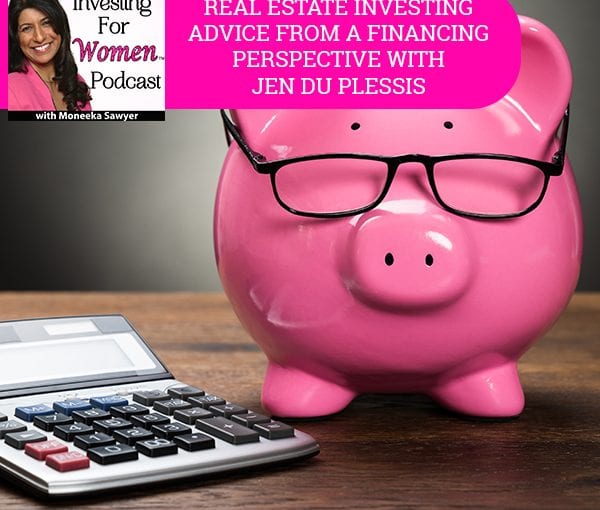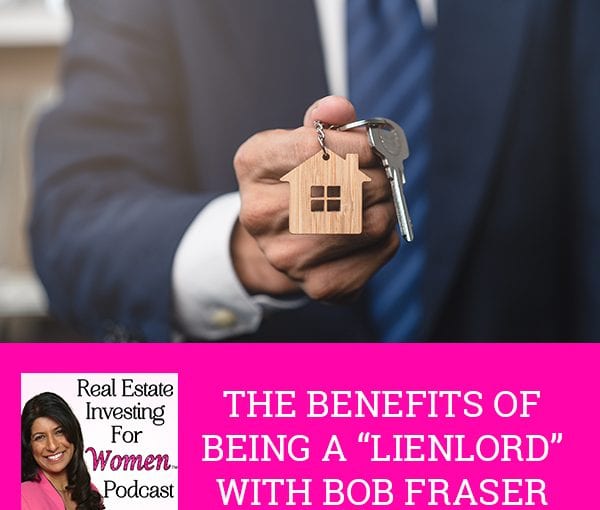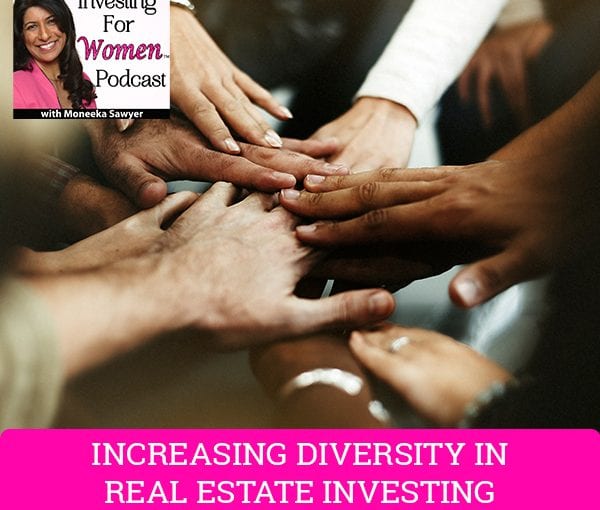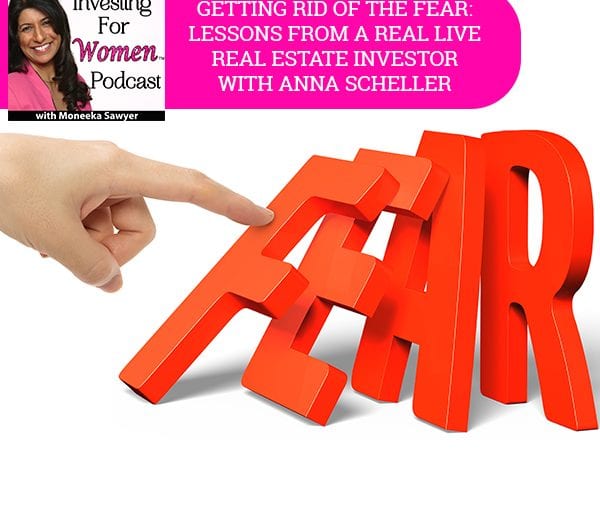Real Estate Investing Advice From A Financing Perspective With Jen Du Plessis
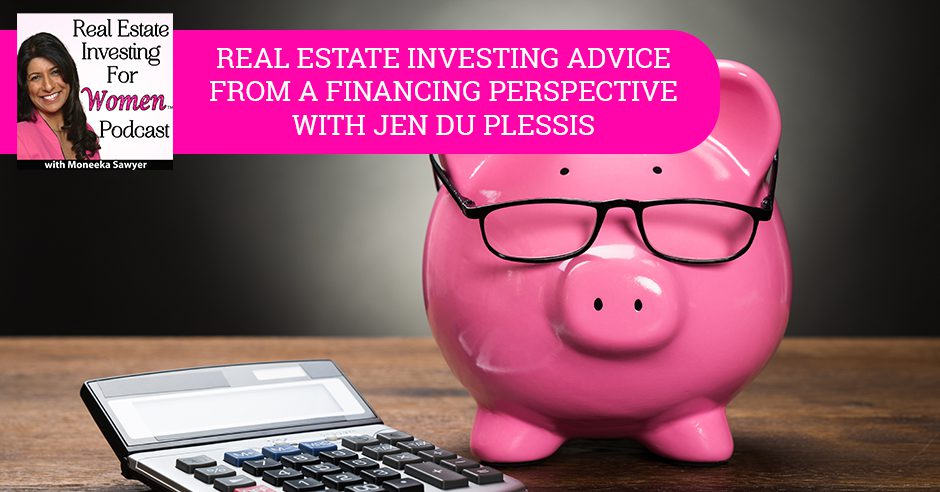
There are so many people who claim to know everything about investing, but unless they do it themselves and are on the ground, it’s better not to take their advice. Far from that, Moneeka Sawyer interviews someone who has a wealth of knowledge and experience about real estate investing. She brings over Jen Du Plessis, America’s Mortgage Mastery Mentor, to share with us some great investing advice from the financing perspective. Jen reveals some of the myths of financing and the things you need to know about local lenders while also sharing advice along the way. Believing that we can live our legacy while building it, Jen then reminds us to live a beautiful life and to play with passion.
—
Listen to the podcast here
Real Estate Investing Advice From A Financing Perspective With Jen Du Plessis
Real Estate Investing For Women
I am excited to welcome to the show, Jen Du Plessis, America’s Mortgage Mastery Mentor believes that you can live your legacy while you were building by working on purpose to play with passion. She is recognized as an influencer in her industry as the best-selling author of LAUNCH: How To Take Your Business To New Heights. Hosts of the top-rated podcast, Mortgage Lending Mastery, which I’d been on, and is a highly sought out and charismatic international speaker speaking on stages with such icons as Darren Hardy, Tony Robbins, and Les Brown.
She works with mortgage loan officers and real estate professionals who are overwhelmed, stressed out, and sabotaging their personal lives for the sake of their business to help them multiply the results in record time while having the courage to say yes to their personal lives which sometimes means saying no to clients. She has been seen and heard on Good Morning America, Sirius/XM Radio, Voice America, and Mortgage News Network, and has been recognized with the Women With Vision Award as one of the Top 20 Most Powerful Women in the mortgage industry.
—
Jen, how are you?
I’m great. I am excited to be here. We had so much fun on my podcast. I can’t wait to have as much fun on yours. We clicked well so it’s an exciting time and I’m happy to share whatever I can for your audience.
I was feeling the same thing. I get to talk to Jen again. I know that your focus is on helping real estate professionals do their job and run their businesses better but tell us a little bit about your investing journey.
I was investing way before. I have ten aunts and uncles. My mom was 1 of 10, five men, five women. All of the men are real estate investors. I was exposed to it since I was young. I was cleaning apartment buildings at Central Michigan University where they own a lot of property. My mom and dad were investors as well. They had a unique way that they did things. That was left to my brother and I when they passed away. We started our own investing. In fact, we bought our first home when we were nineteen years old. My husband and I got married a few months later.
By the time we were 24, we had five properties. At that time, it wasn’t popular for fix and flip and things like that. It was, buy the house and they were cheap back then. You’d save a little money and buy a house. Sometimes we pay cash or we had seller financing and stuff but we did step investing. Part of step investing is also that we didn’t need the cashflow. Therefore, all of the cashflow went back into paying everything off as we went along the line. Later, we traded in the houses for the hotels on the monopoly game and that’s multifamilies and stuff. These days, we’re doing Airbnbs and we’re doing subject tos.
We buy subject to properties. I’m excited about this new market and it’s sad because we’re in COVID challenge. While we’re in the COVID challenge, some people are going to lose their homes. I’m excited about the opportunity to help them, not just to take from them. Furthermore, I was training real estate agents for years and I would ask them, “How many of you own your own home?” I found that a lot of real estate agents never even owned their own homes. They got into real estate and never owned their own home. Those that did own their home, I say, “How many of you have investment properties?”
I can honestly tell you, of the eighteen years I was teaching real estate agents, less than 1% of them owned many homes. To me, that’s like me being a Mary Kay Consultant and saying, “I don’t wear makeup but you should wear makeup.” A sales guy saying, “I still riding on a horse and buggy but you should buy a car.” I found that they weren’t buying their product. I didn’t want to be in that position as a mortgage lender. I wanted to be in a position where I was buying the product that I was helping people achieve and obtain to grow wealth. One of my niches was doing investor loans.
I tell people this all the time. When you’re looking for a mortgage broker or you’re looking for a real estate agent and it’s for your investments, make sure their investors themselves because anybody can sell a house but somebody who understands what it’s like to be an investor, the things you need to look for, they’re going to be a huge asset. I don’t know how or why they do this but a lot of times, they’ll get in the way of you investing in a property because they don’t understand the process. It’s not a perfect home but as an investor, you’re usually not looking for a perfect home for you to live in. A lot of times they don’t understand that you don’t want to see all these condos where they have to be owner-occupied. They’ll keep sending you stuff and it’s not even a qualify for your strategy. It’s important that you are dealing with people that understand what you’re trying to do, and then that could be a huge asset.
I also think that when you deal with people that are in that space, they have their own teams. When your team isn’t available, something goes awry, or they’re too busy, it’s great to be able to tap into their teams as well and the resources.
Get your financials to pull together because the deal of the century comes around every week. Share on XThere are a lot of benefits to dealing with agents and mortgage brokers that get it. Since you’re in mortgages, talk to us about the myths of financing.
We were talking about this in the green room saying, “Are they myths? What are they?” I know that your audience is everywhere from someone who is thinking about investing all the way up to the experienced investor. I want to be careful. I don’t step on any toes on either side. I would say from the perspective of being a mortgage lender and being in the top 200 loan officers in the country, I know what it takes to get these loans done. If you’re starting, go to your local mortgage broker or mortgage lender.
Find someone who understands investments but go to your local mortgage lender. Don’t seek out hard money, private money, and all those things unless it’s a quirky property because otherwise, you’re going to be paying a lot more for it. I would say, start your journey with a traditional mortgage lender and then learn how that process works. For example, after a while, we get to the point where it was painful to get a mortgage and through traditional financing. What do we do? We went to the bank.
That would be your next step. Once you accumulate however many properties, it doesn’t matter, but you have ten mortgages on, you’re going to start running into problems with a traditional lender. That’s going to start scooching you into alternative financing or I call it situational financing where your situation requires that we look elsewhere. That takes you into banking and making it a small commercial loan.
That all by itself is trouble. Good luck with that one. Believe me, we’ve had to go through that and you have to do that as soon as you get past four units anyway, you start heading in that direction. That’s the next step. A lot of people came to me and said, “I’ve been working with this bank for seven months and we can’t get this two-unit closed.” I’m like, “What are you talking about?” It’s knowing that you may have to go through the banking environment. Once you get past the banking environment, there’s a little-known bridge that helps you do build the gap between banking and hard money or private money. Not all hard money and private money is bad.
It’s good but there are this nice little bridge and a lot of people don’t know about it. There are two pieces to it. One is in the mortgage space, there’s something called Qualified Mortgage or QM. This is as a result of Dodd-Frank because of the big credit crisis that we had in 2007 and 2008. As a result of that, everyone has to meet these qualifying mortgage criteria. If they don’t meet those criteria then there was nothing available except going for hard money or maybe finding a bank. They could do a commercial loan. In walks this non-QM, Non-Qualifying Mortgage criteria there are some loose guidelines in there and these are securitized loans. They’re safe. They’re securitized on the secondary market. It’s not like Susie Q out here, Joe Blow, or anything.
Those are good options. The only thing is, there aren’t as many investor options as there are owner-occupied. For example, if you had one day out of bankruptcy, you can get a loan in this as long as it’s owner-occupied. There were a few little non-owner-occupied that allowed you to have more financing on more properties which was not what the traditional lending does. That was a good sense and then we lost QM with COVID. A lot of people don’t know it because of forbearance, everyone stepped back and said, “We’re not going to give anybody a loan and let them not make their payments.” A lot of that has retracted but it’s going to come back and it’s still there. That would be the next step.
Residential, non-QM, banking, and then you get to the financing that I do. I call it situational lending. What I do is I have access to over 45 different lending investors that consist of hard money, private money, securitize money, buy and holds, fix and flips, multi-units, apartment buildings, mixed-used, all of that comes in there. Because of my mortgage experience I’m able to package these loans better than the average person that you would run on the street. I’m able to package these loans, then fish them out to the investors, and find out who’s most interested. Every one of them is case-by-case and I get a finder’s fee. That’s it.
They take over from there and I get a finder’s fee. This has been good for me as was good for me as a lender because if my investors came to me and they had no outlet, instead of saying, “Let me make some phone calls and see if I know Joe Blow down the street who will charge you 12% and four points.” This is a great way for me to move into that market. I’m doing that as well. I’ve got my own private investors and hard money guys too but I still seek them there. I would say, if you’re starting off in investing, I want you to know that there are a couple of gaps that can be filled with some financing and you weren’t aware of rather than going all the way to hard money or private money immediately. There are still options that are wonderful out there for you.
I want to backtrack a little bit to get more clarity. The first thing you said is to go to a local lender and then you said next, you can move to banks. I’m not sure what the difference is between that. Could you clarify?
What’s the difference between a loan officer, mortgage broker, and a lender? The name doesn’t matter for the individual. If you called me a mortgage broker, a mortgage lender, a loan officer, mortgage advisor, it wouldn’t matter. In fact, I was a certified mortgage planner. I have a certification like a CPA in mortgages just like they have in accounting. That doesn’t matter what I’m called. The institution for whom I work with is what’s different. Banks have loan officers sitting in their bank and sometimes, they are the bank loan officers where they can do residential and commercial. Sometimes banks have loan officers sitting in their branches and they are part of the mortgage division of their bank so they don’t do commercial. As a result, they’ll have a commercial loan officer and a residential loan officer still inside of a bank.

Investing Advice: Find someone who understands investments but go to your local mortgage lender. Don’t seek out hard money, private money, and all those things unless it’s a quirky property because otherwise, you’re going to be paying a lot more for it.
You move from there and you go to a mortgage lender. A lot of times, they’re referred to as correspondent lenders. Their staff, their loan officers, originate loans find and help you get a loan. The loan is underwritten to the guidelines of Fannie Mae and Freddie Mac and maybe another investor like Wells Fargo or Bank of America. A lot of different companies out there. This is how I use the terms, that lender funds using their warehouse line, their line of credit. They fund in their name, and then they sell to Fannie Mae and Freddie Mac. A broker is a loan officer, the same thing, but they don’t fund in their own name.
They originate the loan, they help you get the loan but they send the loan to Wells Fargo or another lender to have them underwrite, make the decisions, and fund the loan in their name. They’re a finder. A lot of people think that brokers are more expensive, banks are less expensive, or vice versa. The bottom line is we’re all the same. The pricing is all the same. It’s just the way it’s delivered. It’s about who you feel most comfortable with. I will tell you that when you go to a broker and you go to a lender, you’re going to have more options in investing, financing than you will when you go to a local bank. When you go to the bank, you’re going to have their guidelines. Some of them do sell to Fannie and Freddie but it’s a cookie-cutter.
Everybody else can do Fannie and Freddie anyway. Those are the rates that you see every single day. You have more options going through a broker and a correspondent than you do going through a bank. Here’s what I would say. I need a broker, a lender, and a banker in my repertoire. You need every one of them. There’s this thing called overlays. Fannie Mae and Freddie Mac put out a box that says, “These are our guidelines.” What happens is there are negotiations of overlays. You’ll say, “How come this lender can do it and that one can’t?”
It’s because it was part of the negotiation. It also might mean that it’s a little bit more expensive because it is a little off, stretching your Band-Aid, or a rubber band, your box. I would have all of them in my repertoire and then I would have the private lender, the private money, or the hard money. Now, I’m introducing two other entities which are the non-QM loan officer who does that type of financing as well as the type of financing that I’m doing which is completely different. I don’t do anything owner-occupied at all. Everything is an investor.
You said you’re the finder, what exactly are you doing? Tell me about what this looks like for my ladies that might want to call you on that.
I had a call with a client and she’s looking at buying an 84-unit apartment building in Atlanta. She has somewhat of a portfolio. She still has to get me some documentation to figure that out. What happens is that I collect all the documentation, I build the package not just in tax returns and things like that, but in the DSCR. I make sure what that is. I made sure I note the comps are out there. They have the experience and I’m building their bank statements, their pay stubs, and everything about the property. I’m building that presentation as well as behind the scenes like, “What do they want to do with this? What is their exit strategy look like? Is there an exit strategy? Is this a buy and hold? What are we trying to do with this?”
I then present that to 40 different investors and say, “Who’s interested.” Everyone goes, “Me.” Believe it or not, there’s this big world out there that most people don’t know about but it’s all done digitally. I upload all the information digitally and then I get back 3 or 4 different people then I hop on the phone and get through the details and make sure that this is an area that we can send to them. They write a letter of intent and then I introduce the two parties to say, “Here you go, take it from here.” I don’t get involved with any of that side of it anymore.
I’m the guide who brings you there and says, “Here are my selections of investors. Which ones do you want to invest in your lenders? Which terms seem to be best for you? You can move forward with that.” I’m building that whole package. Here’s what’s funny. A lot of times, there’s no appraisal required, it’s an equity loan. A lot of times, no credit is required, down payments are required but no income verification. Those were the old days but that was through traditional financing, that is gone, and that is not coming back.
What’s coming back is this new hybrid for investors of no income verification, no asset verification. Sometimes no credit or 10% down on an investment property which you can’t get through Fannie Mae and Freddie Mac at all. It’s cool because people value those investors who have experience and know what they’re doing. If you don’t have the experience, that’s okay. You might have to put 20% down but you’d have to do that anyway. They value the experience that investors have. I reward them by making it easy.
Are the rates competitive?
The rates are extremely competitive. I don’t have any issues with any of the rates. They’re scalable depending on the term, sometimes credit score, down payment, how many units. Also, where you are, is there a metropolitan area around you or are you to find something that’s out in the country that’s 84 units. That’s going to have a big play on it as well. As you know, rates are in everything when it comes to investment. It’s about the numbers. My company has lent my other company money at 18% so I can make more money. It’s a different area. I needed the write those on one and I needed the income.
We can live our legacy while we are building it. Share on XAre those longer-term loans or do they have to be paid off in five years? Does that work?
It ranges. The fix and flips are totally different, 6-month, 12-month, 18-month renewals up to 24 and 36 depending on the situation. The buy and holds are 30-year loans. What we’re looking at for her is a 30-year loan on an apartment building.
That’s unheard of. Are you affiliated with a particular company doing those loans?
It’s my company. Whoever else does this, we all pack into there. This was out of a need for my own need to find alternative financing. I stumbled upon them a few years ago. It’s been a Godsend because there have been some great opportunities. In owner-occupied, I’ve had some traditional loans fall apart. Not in this context because it was owner-occupied but I’d be able to go to my private money lender and still save the deal, refinance it later. It’s a great opportunity. It was out of my own need and that’s how I stumbled across in it. It continued to grow with the fact that investment has continued to grow. There’s more confidence, more data to support the fact that we know someone who has one unit is going to perform differently than someone who has 100 units of properties. There’s common sense in there. There certainly isn’t in residential anymore. It is a cookie-cutter.
Are they still lending during COVID? A lot of the lending money has dried up like you were saying with the non-QM.
In traditional financing, non-QM and Jumbo is gone. There are very few places that are doing Jumbo. I’m not even in the business. This is how I love knowing. Freddie Mac came out and said that they’re going to be reducing their high balance conforming. This is a big problem in a lot of high ticket areas. I live in Loudon County which is the wealthiest County in the United States of America. These loans that they’re talking about, they already have taken away because of COVID and they’re talking about taking back the next layer down because of COVID, these are cookie-cutter houses and it’s going to impact our particular area.
Other areas like Florida where the house values are substantially lower. It’s not going to have an impact. There’s still lending in the non-owner-occupied in the investment space. We had a lot of retraction and then it came back again. We had a retraction again with forbearance when that came out. It dabbled back in a little bit. We lost a chunk of investors that we would have. We’ll have them back eventually but forbearance on a commercial is completely different and what is perceived to be a commercial even if it’s residential is completely different than a residential property. It has more risk. That was a blanket policy.
There’s an awful lot to think about around lending.
This is why you need to get with someone who knows what they’re talking about.
That’s exactly where I was headed. Sometimes you read this stuff. Ladies, you might be reading this and going, “My head just blew up. I don’t even know what they’re talking about.” That is true. Even for me, every once in a while, someone will come on the show, “Jen said a couple of things.” I was like, “What does that mean?” I was a mortgage lender. Things are changing all the time. Ladies, don’t get intimidated. The key is to find some people that are investors themselves so they’re interested in this financing that’s going to be a little bit different. It’s going to have different rates, different opportunities, different languaging, and you want to make sure that you’re talking to somebody who understands it themselves so that you’re not having to educate them. They can educate you and take a look at all the options.
Educating on your timeline, your time clock, and your money. I would say if someone is reading this and they’re thinking about buying something that isn’t going to be traditional financing for whatever reason whether it’s the condition of the property, the type of the property, location, or no longer qualifies for traditional financing is to get with me or someone like me in advance. Get your financials to pull together. The deal of the century comes around every week. Anytime it comes around, you aren’t starting from scratch. You get your ducks in a row.

Investing Advice: When you go to a broker and you go to a lender, you’re going to have more options in investing, financing than you will when you go to a local bank.
You said something interesting. There are many times we go out and we look at a property and we’re like, “I have to have this one. There’s never going to be another deal like this one.” The same thing will happen next week or next month. There is no such thing as a deal that you have to have. There are good deals that come up. You want to make sure that you put yourself in a position that if you find an amazing deal, you can take it. If you find an amazing deal and it’s not awesome, you can walk away because you’re set up to do another one. You don’t have to make bad decisions because you think this is the only deal and you’ve got the financing set up for this deal. You want to make sure you are positioned to make the best choices and buy the best properties for your strategy.
Hurry up and stop or stop and hurry up. Both ways are crazy. Getting a call saying, “I have to close in ten days.” Good luck. I can do that on a subject to but I can’t do that in others.
Tell everybody how they can reach you if they do want to ask you questions.
The best way to reach me is [email protected], that’s my email address. Reach out to me and say, “I’d like to have a conversation and get my ducks in a row for something or have you explained this. Not so fast.” I’ve been doing this for many years so I know what I’m doing but have that conversation. You might want to talk it through and say, “I’m not ready to do anything yet but I want to understand it a little bit more.” I’m happy to answer your questions especially as women, we need to be lifting, supporting, and leading each other up. That would be the best way to get a hold of me.
Thank you for that. As women, we do need to be lifting each other up. It’s important. Thank you for offering your time. We’re going to go into our three rapid-fire questions but before that, let’s talk a little bit about what you’re going to be talking about in EXTRA. I know you got some juicy stuff so why don’t you share those.
As my bio said, I believe that people can live their legacy while they’re building their legacy. Often, we’re laser-focused on building and not having this beautiful life at the same time and then dying and not the life, or retiring and then passing away not too many months later because now that purpose has gone. I believe that we can live our legacy while we are building in it but it requires that you’re working with focus so that you can play with passion. That working on focus for me is mastering your priorities so that you can be the master of your life. If it takes you an endless amount of time to do something then you will take that endless amount of time to do it but if you have a timeline, you will finish it. If I gave you 5 miles on a flight path where you had to take off, you would take the whole 5 miles. If I said, “You have to get this plane off the ground before you hit that tree 100 yards away.” You would do it.
What I do is I help loan officers, realtors, and investors how to prioritize everything in their lives. I call it Lifestyle Business Mastery so they can have the best of both worlds. In real estate investing, when the gurus say, “You can be an investor, you need one hour a night to dedicate.” You’re sitting there and going, “What am I going to do in that one hour? I don’t have a plan. I don’t have a strategy. I’ve got all these kid things going on and I can never get to it.” That’s what we’re going to talk about is some of the steps to take to start getting in that direction. I have four businesses, they’re all doing well and it’s because I know how to manage my priorities. I don’t do things that aren’t going to move me forward and serve my greater purpose in life and the outcome I want. That’s what we’re going to talk about.
We’re going to be talking about lifestyle, business, mastery, and EXTRA. That’s going to be amazing. I’m excited about that. Tell us one super tip on how to get started investing in real estate?
Know what type of real estate aligns with your core values, your passion, and your financial wherewithal right now.
What is one strategy for being successful in real estate investing?
Draw a line in the sand for your cashflow, don’t waiver. If your cashflow is every house has to cashflow $250 then do not sign the contract for $249, $9.99. Don’t do it.
Working on focus is mastering your priorities so that you can be the master of your life. Share on XThere’s this line and we have to cross it.
You do not cross this line ever even, “I love the house. It’s cute.” Do not cross that line because once you start crossing it, it becomes a habit and you make bad mistakes.
The next one is, what is one daily practice that you do that you would say contributes to your personal success?
For me, it’s time management, it’s priority management. I get up and I know exactly what I need to do. I get in, I get out, and I go play. That is the key to it. If you master your priorities, you can become the master of your life. We all have the same 24 hours. I maneuver within them quite different than other people to everything that I want to excel. I don’t care if it’s personal or business. If I want to excel something, I maneuver that. I mastered those priorities and make the right choices. It’s small choices that can bite you. They’re like mosquitoes. The constant small choices versus the big elephant. It’s not the big choices that hurt you, it’s the small ones that hurt.
I can’t wait to hear more about that in EXTRA.
I can’t wait to share it. Come on over.
This has been awesome, Jen. Thank you for all that you’ve shared in this portion of the show.
You’re welcome. Good luck to everybody. Thank you for having me.
Ladies, we’ve got more coming in EXTRA. If you’re subscribed, stay tuned. If you’re not subscribed but would like to be, go to RealEstateInvestingForWomenExtra.com and you can subscribe. You get seven days for free so you can get this EXTRA and then many others, see if it’s for you. If it’s not, you don’t subscribe but at least you can try it out. For those of you that are leaving us, thank you for joining Jen and I for this portion of the show. I appreciate you. I look forward to seeing you next time. Until then, remember, goals without action are just dreams so get out there, take action, and create the life your heart deeply desires. I’ll see you soon.
Important Links
About Jen DuPlessis
 Jen Du Plessis, America’s Mortgage Mastery Mentor helps mortgage loan officers and real estate agents who are overwhelmed, stressed out, and sabotaging their personal lives for the sake of their business to multiply results in record time and have the courage to say yes to their personal lives (which sometimes means saying no to clients).
Jen Du Plessis, America’s Mortgage Mastery Mentor helps mortgage loan officers and real estate agents who are overwhelmed, stressed out, and sabotaging their personal lives for the sake of their business to multiply results in record time and have the courage to say yes to their personal lives (which sometimes means saying no to clients).
During fifteen of her 37-year career in the mortgage industry, Jen has been listed in the top 1% of loan officers nationwide; spending 3 years in the top 200 of nationally ranked originators and has funded over $1 Billion in mortgage loans. She is recognized as an Influencer in her industry as the best-selling author of LAUNCH-How to Take Your Business to New Heights, top podcast host of Mortgage Lending Mastery, and highly sought out and charismatic speaker; speaking on stages with such icons as Darren Hardy, Tony Robins and Les Brown.
Today Jen is passionate about empowering mortgage loan officers to achieve professional and personal breakthroughs so that they stop the daily chaos by identifying their priorities to gain calm to take back control of their business and life. She is guiding her coaching students to attract clients rather than chasing them. And lastly, she is devoted to helping each student’s business grow exponentially rather than hitting the reset button to have the same results year-after-year.
She has been seen and heard on Good Morning America, Sirius/XM Radio, Voice America and Mortgage News Network. Jen has been featured in publications such as The Wall Street Journal and The Washington Post; is a regular contributor to Mortgage Executive Magazine and Mortgage Women Magazine and has been recognized with the Women with Vision Award as one of the Top Women in the Mortgage Industry.
Love the show? Subscribe, rate, review, and share!
Moneeka Sawyer is often described as one of the most blissful people you will ever meet. She has been investing in Real Estate for over 20 years, so has been through all the different cycles of the market. Still, she has turned $10,000 into over $5,000,000, working only 5-10 hours per MONTH with very little stress.
While building her multi-million dollar business, she has traveled to over 55 countries, dances every single day, supports causes that are important to her, and spends lots of time with her husband of over 20 years.
She is the international best-selling author of the multiple award-winning books “Choose Bliss: The Power and Practice of Joy and Contentment” and “Real Estate Investing for Women: Expert Conversations to Increase Wealth and Happiness the Blissful Way.”
Moneeka has been featured on stages including Carnegie Hall and Nasdaq, radio, podcasts such as Achieve Your Goals with Hal Elrod, and TV stations including ABC, CBS, FOX, and the CW, impacting over 150 million people.
Get Real Estate By Trading Assets with Ryan Matthews
Ryan Matthews is an inspirational speaker, author and decorated veteran who trained elite Army K-9s and then became a civilian dog-trainer using his proven formula to train over 3,000 dogs. He earned almost $1,000,000 in 2½ years. As a workaholic; his success was plagued by the effects of a childhood trauma and PTSD. At age 30 he was diagnosed with multiple, life-threatening conditions.
After a near-death experience, he felt like a failure. He decided to transform himself and
share his story to help others thrive.
Author of “The Canine Connection” and “Heel Your Dog, Heal Your Life”, Ryan mission in life is to share his gifts and talents to positively transform the lives of others. His TEDx talks are called “Overcoming PTSD with Dog Training Techniques” and “Let’s Treat Each Other More Like Dogs.”
For more information visit www.WorldOfDogTraining.com.
In this show we discussed:
1. How Ryan traded unexpected assets to buy real estate and build a profitable portfolio.
3. How do you handle the negative thoughts that come to mind before a big deal/decision?
4. How does dog psychology translates to human psychology? The formula: RTCR
5. What’s your best tip for real estate investing?
If you’d like to get Ryan’s free gift The top 10 strategies to train your furry friend! go to bit.ly/10dogsecrets
To listen to the EXTRA portion of this show go to RealEstateInvestingForWomenExtra.com (https://glow.fm/realestateforwomen/ )
To see this program in video:
Search on Roku for Real Estate Investing 4 Women or go to this
link: https://blissfulinvestor.com/biroku
On YouTube go to Real Estate Investing for Women ( https://www.youtube.com/channel/UC4FF7vwqQI1HsZ1uXln4-uQ/videos)
——————————————————
Learn how to create a consistent
income stream by only working 5 hours a month the Blissful Investor Way.
Grab my FREE guide at http://www.BlissfulInvestor.com
The Benefits Of Being A “Lienlord” With Bob Fraser
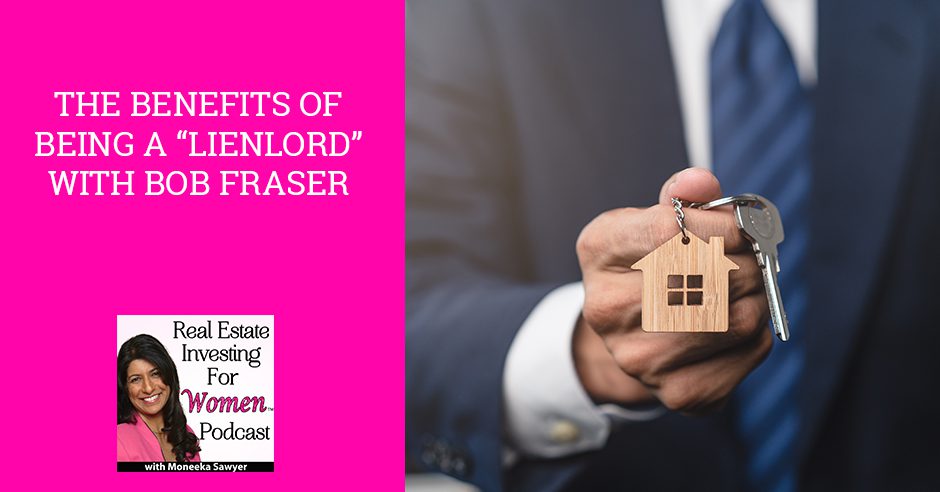
Mortgage notes, also known as real estate lien notes, are loans that borrowers take to purchase a property that actually have many benefits and offer unique opportunities. On today’s podcast, Bob Fraser of Aspen Funds sits down with Moneeka Sawyer to talk about how he got into real estate investing, particularly residential mortgage notes, and shares the benefits of being a “lienlord.” Bob is on a mission to help investors take advantage of this effective and often overlooked avenue of real estate investing. Tune in to see if this is the right avenue for you, too!
—
Listen to the podcast here
The Benefits Of Being A “Lienlord” With Bob Fraser
Real Estate Investing For Women
I am excited to welcome to our show our guest Bob Fraser. Bob is on a mission to help investors take advantage of one of the most effective and overlooked avenues of real estate investing, residential mortgage notes. As Founder and Principal of Aspen Funds, Bob has purchased more than 1,000 mortgage notes, earning double-digit annual returns without the risk and volatility of traditional investing options. Bob, welcome to the show.
It is great to be here.
This topic is so hot. We did have someone else on the show talking about notes. I got many emails from my ladies who were like, “Give me more.” I’m excited to have you here. Bob, let’s start by telling us a little bit about your story and your history.
I was a computer scientist. I was a computer programmer for many moons and then I started a big tech company. I ended up raising $44 million in venture capital and built a high-flying tech company in the late ‘90s and then it got wiped out when the stock market crashed. I lost everything. From that point, I started looking at different asset classes and got into real estate. The idea was let’s try to avoid the stock market volatility where one day, all of a sudden, your nest egg is gone. The traditional thinking is, “Let’s stay out of the real estate. It is risky. Let’s do the stock market where it’s liquid.” That’s the problem when you have these kinds of drawdowns. It’s no fun to be in the stock market seeing these 900-point crashes we’ve had and these kinds of things. I was looking for something a little bit different out of what I had been doing and that’s what led me into real estate.
How did you get into notes specifically?
I met my partner years ago. He’s a real estate guy and he lost everything in the 2008 crash. We were comparing our scars. We both had the same scar in different places and different time frames. He said, “The guys that are doing well in this space are the guys that are on the other side of debt equation. Rather than being a borrower, they’re the lender.” He started doing all the research into that space and we got started. I was a finance guy and an operations guy at that point. He showed me the models he had come up with and I was completely blown away. I said, “This is too good to be true. Let’s try it.” I let him invest my IRA for a little while. I said, “We got to jump into this. We started a little beta test fund with friends and family, and it’s been off to the races. We’ve had five funds since then and we’ve scaled and have grown the business and taking care of our investors. We got into it by realizing that the better place to be is on the other side of debt.” It has a lot of different characteristics than traditional real estate investing.

Residential Mortgage Notes: The guys that are doing well in the real estate investing space are the guys that are on the other side of the debt equation; rather than being a borrower, be a lender.
Tell us a little bit about that. What are the characteristics?
First off, I bought a little condo or a little duplex to rent out. It was such a horrible experience. I’m a good computer guy but I am not a good hammer and nails guy. I’ll admit that upfront, but it was a nightmare. I am trying to keep around there. I had evictions, stuff broke, and toilets didn’t work. I even hired a manager and it still isn’t working so I finally sold it. I felt good to be done with that. Meanwhile, my notes portfolio is killing it. When’s the last time you called your bank when your plumbing didn’t work? That’s us. We don’t get phone calls.
The first thing is it’s completely more passive and more hands-off, the note space. Think about a bank that can own hundreds of thousands of notes and we own thousands and thousands of notes. It’s much more scalable business and you have less volatility. If you think about the housing price going up and down over the years, but the debt piece is significantly cushioned from that. Maybe your house is worth $300,000, but you’ve only borrowed $200,000 on that. The house has to drop below $200,000 before me. As a lender, I’m concerned. It’s much safer and it’s mailbox money. I get paid as the bank. People send me the money. It’s nice like that, but I have a little maintenance and overhead costs. It’s far superior if you’re looking for more passivity and more safety.
Do you have a team that does collections of people who don’t pay? Do you have a problem with that at all?
Yes. You have a lot of notes so you have people that don’t pay, but we’re the bank. We have a lien on that house. Worst case scenario, we began talking to that borrower. In most cases, what we do is we hire a loan servicer that manages all the statements, sending the statements, the 1098, all the taxes, and all that stuff. We do have an in-house collections team to reach out to these borrowers.
I’ve only had to go through one eviction ever in my many years of being in the business. That’s why I’m teaching about making it blissful when I’ve had many properties. I will say that my tenants all pay early. My tenants give me a raise every year without me asking. I’ve got things set up, but every once in a while, I do need to collect rents. It’s not fun and you don’t have a lot of leverage. Fortunately, I’ve set up my system so I’m not doing that often. If somebody is late, I charge them a fee and they usually pay almost immediately. Anybody who doesn’t pay immediately, it feels yucky. That’s one of the yucky pieces of the business. It’s interesting to address that even in the notes business, you have to have a collections team and stuff like that. This is one of those things in every real estate business that we have to deal with no matter what. You’re not going to get away from it by going into a different strategy. Ladies, if you’re trying to run from that piece, understand that it is not awesome. There are blissful ways to handle it. One of Bob’s choices is to hire a team. He’s not doing that piece that’s not fun for him.
There's not one real estate market. There are many real estate markets. Share on XThe average default rate in the notes space is about 1%. I don’t know what it is in rentals, but my guess is it’s higher.
For me, it’s probably about that in my business and not everybody runs their business the way I do. That’s the value of pursuing a blissful way. I might have one late rent check every three years or something like that, but it’s nothing. I just send it and say, “Did you mail it? I didn’t get it. Could you resend it?” and it’s done. That’s a good valuable information. You’ve already talked about some of the benefits of doing notes. Let’s specifically talk about being a lien holder and some of the specifics that people can look forward to by doing that.
We talked about less maintenance, that kind of thing. We talked about the safety factor so that you’re not as worried about the downturns and those kinds of things as much. The other thing is that depending on the kind of notes you buy, you can buy them at a discount. This is a real note that we own. It’s a $100,000 house in Upstate New York. The guy owes us $100,000 on his loan. We only paid $50,000 for that note. He doesn’t know that. He pays us $600 and something a month. It’s a 7% interest rate that he’s paying, which is a pretty good return. Because I only paid a $50,000 for that note, my return is 14%.
Even more exciting is after I get paid my 14% return for a while, if he chooses to refinance or sell that house, I get paid off. I don’t get paid off $50,000. I get paid off $100,000 so I double my money. We don’t always get a 50% discount on these loans, but we’re buying loans at 20% discounts quite often to 50% discounts. Every time there’s a refinance or a sale, we make money. It’s a profit of 13%, 14% monthly until we earn a 50% gain or a double cap gain on that all passively. We have about 8% of our portfolio that’s self-liquidating every year. People sell or refinance their homes and we get paid off. It’s a massive hunk of cashflow. Some people think that’s a pain, even though it’s a profit because you have to reinvest. You have to find something else to buy, but because we’re so active, we’re always shopping and we’re always finding these notes. It’s awesome to think you can get a cap gain and a note.
Tell us why Aspen Funds invest in real people, not just in real estate.

Residential Mortgage Notes: The note space is a much more hands-off and more scalable business.
We do buy these loans and defaulted loans as well, where people aren’t paying and have been having trouble for a while. We are able to modify those loans and wipe out a lot of debt for people. We do everything we can to keep the borrowers in the homes and only ended up foreclosing about 2% of the time that a loan goes into default. We feel happy about that. We are able to help people stay in their homes. If they want to and they’re trying, we can work with them to do that.
In the Extra portion of the show, we are going to be talking about your economic analysis on what’s going on in the market. Could you give us a high-level idea of where you’re at around that and what we’re going to be talking about later?
We’re going to go into asset prices and specific asset classes because there’s not one real estate market. There are many real estate markets. I am seeing some real estate markets that are attractively priced and I see real estate markets that are unattractively priced. We will talk about that more in the extended portion of the show. I want to talk about in this portion the state of the housing market. There is a lot of fear out there about the housing boom being over. We bought them in 2013 so it’s been a long run. Most real estate investors are getting nervous. My personal view is that in the single-family real estate market, we have quite a bit more running room. It depends on where you are. If you’re on the coast, it’s a little more challenging, but in the bread and butter Midwest areas, Florida and other places, the prices have a long way to run. What happened in the Great Recession, you saw housing starts to roll-off almost to a very few? Multifamily also starts to roll up. They both went to zip.
For those of you that don’t know what housing starts are, it’s building. It refers to the new homes that were coming on the market.
Multifamily and apartment complexes went on a tear and has recovered massively to where it was before the recession and even more. Single-family homes have never recovered. Years ago, you could buy a piece of land, build a house, sell that house and make money. Now, you cannot do that because the costs are too high relative to the price. Inflation has continued to run for years and housing prices have not kept up with inflation. I have an economic deck that we can send to your audience if they’re interested that shows inflation-adjusted housing prices are far below the peak in 2005 and 2006. Housing prices, especially in the single-family markets, still have a lot of running room after the fact that housing is far more correlated to the jobs market than anything else.
With the jobs market hitting new records every day and low unemployment, it’s a different animal. There is more running because there’s more demand. There’s a huge shortage of single-family homes and that shortage is systemic. It is baked into the system. Until we see more housing being built, you’re not going to see that. One other little piece here, if you look at the unemployment rate hitting record lows, people may not be aware that Hispanic unemployment and black unemployment is hitting record lows for 60-year records. Even the minorities are participating in the game. We’re seeing the housing especially in the lower end of the housing spectrum doing super well. There’s a lot of demand being created. People that have jobs end up wanting to buy a house. There are lots of reasons for the housing market to run for a little while longer. I have about seven factors that play into that. It’s all in there.
Talk to the most successful real estate investor, buy him a cup of coffee, and pick his brain. Share on XWe will talk about that in the Extra portion of the show so people can get a deep understanding of what you’re talking about. That was a great high level. Thank you for that. I’ve got all my opinions about that. I’m interested in that conversation. Could you tell everybody how they can reach you, Bob?
You can go to our website, www.AspenFunds.us.
For clarification, Bob, do you run a fund or do you teach people how to do notes or both?
We run a fund. We do not teach people.
That’s good clarity. Ladies, if you’re interested in the bliss approach to investing in funds, Bob might be that person that can help you to do that. He handles all the yucky stuff and you just get the money. He started using his 401(k). You ladies know that you can get a self-directed IRA and we know through Bob, you can start investing that IRA into notes and making huge returns. Bob, are you ready for our three rapid-fire questions? Tell us one strategy or super tip on getting started in real estate investing.
Talk to the most successful real estate investor, buy him a cup of coffee and pick their brain.

Residential Mortgage Notes: There’s a huge shortage of single-family homes, and that shortage is systemic.
What is one strategy on being successful in real estate investing?
Value-based purchasing. Look at the price of the house relative to the equivalent rent so that we price everything based on value. It’s the Warren Buffett investing model.
What is one daily practice you do that you would say contributes to your personal success?
It’s a weekly practice, but I dedicate two days a week at least to be alone in my office by myself. I don’t answer the phone. I don’t do anything else. I focus on getting the things done that I need to get done. That allows me to be productive. Segregating your time like that.
Nobody has said that on this show before. Bob, this has been informative. Thank you for what you’ve offered my audience so far. I’m looking forward to what we’re going to do next.
It’s good to be here. It is fun to talk with all these awesome ladies who are out there making a difference and taking the bull by the horns. Well done.
Thank you. I am very proud of my audience. They are action takers. They’re smart. They’re ready to go. I love them. We’ve got more an Extra. We’re going to be talking about specific economic details, what to do when the market has become volatile. There are good markets and bad markets. Bob’s going to be sharing a lot about markets. He’s going to be sharing about asset classes and talking to us about where we could invest and/or where we should stay away from. I’m looking forward to that in Extra. If you’re not subscribed to Extra but would like to be, go to RealEstateInvestingForWomenExtra.com. Thank you for joining Bob and I for this portion of the show. I look forward to seeing you next time. Until then, remember goals without action are just dreams. Get out there, take action, and create the life your heart deeply desires. I’ll see you next time.
Important Links
About Bob Fraser

Mr. Fraser has 20+ years’ experience as a finance and technology executive and is a Magna Cum Laude U.C. Berkeley computer scientist and a former Entrepreneur of the Year Award winner. Fraser is responsible for financial management, portfolio modeling, as well as systems and processes, designing and deploying Aspen’s scalable state-of-the-art back-end platform.
In 1995, Mr. Fraser founded NetSales, Inc., a back-office e-commerce provider. As a CEO, Mr. Fraser raised $44 million in investment capital, and guided the company to an average of 20% month-to-month revenue growth, becoming the metro area’s fastest-growing company between 1997 and 1999.
Since 2002 Fraser has founded and served several non-profit organizations as a board member and CFO. Fraser has also been involved in a number of entrepreneurial initiatives, including book publishing, financial consulting, and an investment fund managing member.
In 2012 Fraser co-founded Aspen Funds, a fund management company focused on mortgage investments.
Love the show? Subscribe, rate, review, and share!
Moneeka Sawyer is often described as one of the most blissful people you will ever meet. She has been investing in Real Estate for over 20 years, so has been through all the different cycles of the market. Still, she has turned $10,000 into over $5,000,000, working only 5-10 hours per MONTH with very little stress.
While building her multi-million dollar business, she has traveled to over 55 countries, dances every single day, supports causes that are important to her, and spends lots of time with her husband of over 20 years.
She is the international best-selling author of the multiple award-winning books “Choose Bliss: The Power and Practice of Joy and Contentment” and “Real Estate Investing for Women: Expert Conversations to Increase Wealth and Happiness the Blissful Way.”
Moneeka has been featured on stages including Carnegie Hall and Nasdaq, radio, podcasts such as Achieve Your Goals with Hal Elrod, and TV stations including ABC, CBS, FOX, and the CW, impacting over 150 million people.
Increasing Diversity In Real Estate Investing With Deidre Woollard

Real estate is a male-dominated industry where women are underrepresented and have a hard time breaking through. Calling for an increase in diversity in real estate investing Moneeka Sawyer interviews writer, editor, and real estate investor, Deidre Woollard of Millionacres. Here, Deidre reminds women investors of their great capacity to find success in the field, inspiring them to get out there and put themselves forward. She talks about investing according to the cycles of our lives, creating a diverse portfolio, real estate crowdfunding, Real Estate Investment Trusts (REITs) and more. Tune into this great episode to receive advice that is for women and given by women. Join Deidre and Moneeka as they provide other great insights unique for women in real estate.
—
Listen to the podcast here
Increasing Diversity In Real Estate Investing With Deidre Woollard
Real Estate Investing For Women
I am delighted to welcome to the show, Deidre Woollard. She is a writer, editor and real estate investor. Her passion for real estate writing began when she created the first Estate of the Day column online and worked for AOL Real Estate. She later worked for Realtor.com and created the Ask A Realtor column. After that, she moved on to spend several years leading marketing departments at luxury brokerages across Los Angeles before co-founding a real estate public relations firm. She now works with the team at Millionacres, helping to provide education on a wide variety of real estate investing topics. Her passion is helping educate people on the ways that real estate helps build wealth. Deidre, welcome to the show.
Moneeka, thank you.
Before I bring Deidre on, ladies, I want to tell you a little story. David and I got married many years ago. In those early days, one of the things that we knew was that money was important in the world. We both came from families that had open conversations about investing, money and how money worked. We also both had ambitions beyond what we had learned from our family. My husband was working at a startup. We were not making very much money. We were broke. We bought our very first home for $10,000 from our wedding. We had so little money left. We had these dreams. We wanted to travel and see the world. We wanted to focus our lives on the fun of living rather than focusing so much on paying the dues when we were young so that we could live later.
We started to investigate what investing could look like even with us, where we had so little money. At least we had bought a house. Both of us knew that was a good idea, but we had so little money. We were paying a mortgage. We rented out a room in the house. We took that money. We wanted to invest it so that we could travel and we can build for our futures. Motley Fool book had come out the year before. We picked up two books. David and I read together every night. This is another one of those things we’ve been doing for many years before we were married. In those early years, we were reading financial books.
Motley Fool was the very first book that we read. It completely changed our perspective on life, money and the world. A few years later, we shut down our houses. David took a leave of absence from work. We put some backpacks on our backs and we traveled the world for six months. I tell people over and over again that it started because we got a good education. Real estate has been a big piece of that, but on the stock side, this was the big influencer. I got an email from Millionacres, which is the real estate division of Motley Fool. They said that they rated my blog as a top ten blog in real estate. I screamed, jumped up and down, I was clapping my hands. My husband was like, “What is going on?” I told him and both of us were so delighted. I immediately contacted them. That’s why we’re talking to Deidre. You have had such a huge impact on my life. Thank you.
One of the reasons Millionacres exists is because we wanted to take that same idea from the Motley Fool and how it helped people and bring that to real estate. There’s so much information out there, but it’s so confusing sometimes. It’s the same mission but translated into real estate.
That’s the gift. With the Motley Fool, they made it approachable, understandable and unscary. We could take some action. I know that’s where you’re headed with this too. It’s needed out there because it can be confusing.
Our goal is to make you smarter, happier and richer, which we all want to be smarter, happier and richer.
Any good investor knows that there's active and passive elements to all investments. Share on XTell us a little bit about how you developed a passion in real estate.
I started from the journalist side, from writing about it. Through writing about it, I started to meet many interesting real estate agents and brokers. This was one of the early days of blogging when there weren’t a lot of blogs. The real estate agents that were getting involved in technology started reaching out to me. It gave me this passion for understanding real estate as a profession and realizing how hard real estate agents work and understanding what the profession is like. I’m seeing the ways how especially women could become entrepreneurs through real estate. That was inspiring to me.
I loved many things about the conversations I’ve had back and forth with you and Sarah. Sarah was the person that reached out to me. When I was connecting with her about who I could bring onto the show to represent Millionacres, she started talking all about the statistics for women in real estate, which is relevant and important. It’s helpful for us women to understand that we’re under-represented, but it doesn’t mean that we don’t have this huge capacity.
One of the things that I’ve seen is that there are a lot of women who are in residential real estate as a career. There aren’t as many women who understand real estate investing or feel confident. One of the things that is true for a lot of women was a study by the Harvard Business Review that men will apply for a job when they’re 60% qualified. Women will not apply until they’re 100% qualified. Sometimes we as women have that little barrier where we feel like, “I’m not sure if I know enough. I’m not sure if I can handle the risk. I feel like I need to wait on the sidelines longer.” That happens both in real estate leadership and in real estate investing. One of my passions is encouraging people to get out there and to put yourself forward.
We’ve had a lot of real estate agents on the show that are women. They have excelled well. Investing is a completely different thing. For whatever reason, it seems like women are more willing to become an agent. They see their clients invest. A male agent will look at the property first to see if he wants it before he offers it to his clients. I’ve seen this out there because I was a mortgage broker. The women will offer to our clients first before she makes an offer, which is not always true. I don’t want to be over general. I saw it a lot. I was like, “Why is this happening?” I was the only female agent that was out there making offers on investment properties. It was interesting. Could you tell us a little bit more about the statistics?
What we did is we surveyed about 650 people and we got their opinions on real estate investing, both gender diversity and racial diversity, what people are seeing, and if they feel like the situations need to change.
What were your results? Tell us about that.
The first thing I found that’s interesting is there’s a little difference in how men and women invest. Our survey found that men are more likely to invest in REITs, Real Estate Investment Trusts, whereas women are more likely to invest in rental properties. That may be a comfort level thing. Sometimes I feel like women are encouraged more toward owning homes versus owning commercial real estate or owning real estate investment trusts. I’m not sure about you, but I feel like a lot of the stock advice sometimes can tend to feel a bit male skewed.

Diversity In Real Estate: As an investor, you don’t necessarily need to be in the same types of investments at different portions of your life.
I was on a class and every single book that was recommended was by a man. They recommended ten books on the show. I thought, “There’s not a single book out there written by a woman that you value.” We see that in our industry a lot.
I see that on the commercial side and also the real estate investment trusts. Most of the books are written by men. I don’t think women understand that especially real estate investment trust or real estate crowdfunding are great passive investments. One of the things I feel is that there’s no such thing as active and passive being separate because they both require a certain level of active and passive. If you’re an active investor, you’re finding ways to automate or to use a property manager. I loved one of your podcasts with Kris Ward talking about how to use automation and things like that. That’s important. Any good investor knows that there are active and passive elements to all investments.
Tell me a little bit about what you perceive as the advantage for women in different investment strategies in real estate.
Some of it is the diversification and understanding what you need in particular time periods in your life. As an investor, you don’t necessarily need to be in the same types of investments at different portions of your life. If you have kids, you might not want to be dealing with individual rental properties when your kids are little or something like that. When you’re older, you may want REITs or something that’s providing you with a little dividend income. If you’re wanting to do short term rentals, let’s say you want to move somewhere else. You may have that short-term rental as that bridge property to get you there. I feel like investing is something that changes throughout your life. We all go through different seasons of our lives. A different type of it can help you with that different stage.
I love the way that you’re talking about the cycles of our life. It’s hitting home for me right now because I’m in a big transition. I started very young. We first bought our first home. There have been a lot of different strategies that we’ve used along the way both for stock and for real estate. For the most part, I’ve had everything in appreciation. I’m in California real estate, most of it is appreciation. We’re changing to cashflow and more passive strategies because David and I are looking at retiring in a couple of years. One of those things that we don’t talk a lot about in the show or anywhere is the cycles. One of the things that I feel that with men, it’s about the strategy and what’s going to make them money and what they’re excited to learn about. For women, we do need to focus a lot more on the cycles, what fits in, where and why and shift as the cycles do. Do you believe that’s true also?
Absolutely. That’s one of the reasons that we have many female writers on Millionacres. We’ve got women who are using different types of strategies throughout their lives. We’ve got one woman who’s investing in a lot of tax notes and she’s traveling the world right now. She and her husband were in Mexico. They own some properties, but they also invest in a variety of other things. It’s about what you want in your life and how real estate can help you no matter where you are and what you’re doing. There have been periods of time in my life when I’ve been more interested in owning property or periods of time in my life where I’m much more interested in something that doesn’t feel quite as labor intensive.
Tell us a little bit about what Mogul does.
Mogul is our premium service from Millionacres. It works like the Motley Fool. The Motley Fool has a free site and then there are premium services that do stock recommendations and things like that. Mogul is like that in that we do real estate recommendations for real estate investment trust and some real estate equities. We also do recommendations for individual real estate crowdfunded deals. Those are usually for accredited investors. You have to have a certain income to qualify for those. You’re investing a sum of money and it is held for a period of time to do something like redevelop an office building or build an apartment complex or something like that. At the end of that, you receive distributions throughout the course of the investment. You get your capital back plus the profits when the deal gets sold.
Diversification is the gift that takes a little bit of pressure off. Share on XMogul focuses on a lot of different strategies. Could you talk a little bit about some of the specific strategies that you like to recommend to ladies to create some diverse portfolio or how do you recommend that?
It depends on how much money you want to spend and what kinds of things you like to do. One of the reasons I like real estate crowdfunding, especially even with something like one of the smaller regulation A-deals where you don’t need to be qualified to be accredited investor. You can still invest a couple of thousand dollars in a REIT to develop certain types of properties. It’s exciting but also diversification is important. One of the things with rental properties or fix and flips is it can be a lot of pressure. Diversification, the gift of that to me is that it takes a little bit of that pressure off. It’s the same way with stock investing. I like to have my money in different sectors because different sectors perform differently at different times. We’ve been studying what’s happening with the COVID-19 pandemic in real estate. You can see that certain sectors are doing well and certain sectors aren’t doing well. Hotels, malls, and things like that aren’t doing well, but you’re watching warehouses, self-storage, data centers, those things are doing well.
Could you tell us a little bit more about how REITs work? I don’t think I’ve had somebody come onto the show and talk about that.
I love talking about REITs. They’re my favorite. REIT is Real Estate Investment Trust. Most of them are publicly traded. You could buy it like a stock, but it’s a little bit different than the stock because they have to pay out 90% of their income. They have to pay you dividends. One of the reasons people like them in retirement accounts is because you get dividends. Most of them are quarterly, but there are a couple of REITs that pay monthly dividends. You can hold them in a retirement account, which is nice because that way you’re not taxed on those dividends. You can hold them in a Roth IRA or something like that. That’s a great way to grow your retirement portfolio.
They have to pay 90% of their income. Why don’t you explain that?
It’s a little bit different than a stock because the REIT is holding real estate. You don’t look at the earnings per share as much. They move a little bit more slowly than stocks. Another piece of research we did was looking at how REITs versus stocks performed over time. We found that over twenty years, REITs will outperform the S&P 500. It hasn’t been true in 2019 where the S&P 500 has outperformed REITs. Especially in 2020 because tech stocks have been zooming including Zoom. Real estate has not been doing so well because of the pandemic and because of how many things were closed, which makes it a good time. A lot of those real estate investment trusts are undervalued for what they are.
Where would you look for those?
In Millionacres, we have a whole section on REITs. They’re part of the stock market. You can start looking at things like malls. Simon Property Group is the biggest mall REIT. There’s Empire State Realty Trust, which owns the Empire State Building. REITs underlie so much of the real estate in the United States. It’s fascinating. You can invest in warehouses. There’s a REIT called Prologis, which is the biggest warehouse REIT. Amazon is their huge customer.

Diversity In Real Estate: Passive does not necessarily mean set-it-and-forget-it. You set it for a certain amount of time, and you revisit it because things change—the economy, your needs, the investment, and the way the market’s moving.
Would you go on Schwab, Fidelity, or whatever and look for REITs? Is that what you would put in there?
They’re like regular stocks.
I had no idea about that. I do this stuff. I didn’t even know about it. I knew about REITs, but I hadn’t done enough research to know very much about them. Do you talk about them on Millionacres?
A lot of our stories are on REITs. We do a lot of talking about this particular sector. That’s one of the things that even within REITs, which is a sector, there are different sectors. There are all those different categories and that’s one of the things that makes it exciting.
It’s so accessible and so easy. It is pretty passive. It’s as passive as you might say with stock. You need to do the initial research.
One of the people at Motley Fool got me into this idea of journaling my investments. Much of the stock market are emotional and you see the market go up and down, and it’s very easy to get caught up in that. When I’m thinking about a new investment, I write down why I want to invest in it, what I think about it. Quarterly, usually when the earnings come out, I love to listen to the earnings calls. I like to hear the voices and the people answering the questions. I go back to that journal entry and it’s like, “Did everything that I believed about that company three months ago still true? Do I still feel the same way? That’s a check-in. It’s passive but it’s not completely passive.
This is worth a deeper conversation. When we talk about passive, it does not necessarily mean, at least in my mind, a set it and forget it. You set it for a certain amount of time and you revisit it because things change. The economy changes. Your needs change. The investment changes. The way the market is moving changes, regardless of the economy. Different industries or investment types change. Things change. Set it and forget it means you’re not tinkering with it all the time, but you should have a period of time that you have set for yourself that you’re going to re-evaluate what you’ve invested in. For David and I, it is a quarterly thing. We do it like you do, Deidre. For my father-in-law, he does it once a year. For my dad, he does it once a month. It’s not like they’re constantly tinkering. It’s not like you’re buying, selling and paying commissions. They’re not doing all that stuff, but they’re re-evaluating their portfolio and their investments at a designated period of time. That is what I consider passive investing. You’re not just letting it go.
It helps take the emotion out of it. The thing that I see with the stock market especially right now is people get so wrapped up in, “I want to buy the bottom. I want to get in at the lowest rate. I want to sell it at the highest rate.” It’s a great idea in theory but it is not practical. What you want to do is spend most of your time. It’s like in real estate when people always say, “You make your money when you buy.” The same thing is true with a real estate investment, trust, or any stock. You spend the time on the research. If you trust the company. You look at the management. You trust everything that they’re doing. You see the vision. Those check-ins are just check-ins. They’re not panic moments. When the market is doing something weird and your stock went way down, you don’t panic because you’ve already made your decision. You trust that company. That’s important is to find those ways.
You don't time the market; you time your life. Share on XI’m an emotional person. I want to find those ways to make myself feel confident. That’s one of the reasons that if I am feeling that way, I do make a note in the journal and talk about that, get it out of my head. I’m not thinking about what the stock market did yesterday and making myself nervous over it and trusting myself. I feel like that’s one of the ways you can learn to trust yourself more, which is important, especially for women in investing.
Much of the time I’ve said, I’ve been told and reminded by my husband, if it wasn’t a good investment when you got it, check that it’s still a good investment and you don’t lose money until you sell. If the market has done crazy things, just check in. Is this still a good investment? If you’re talking about REITs, do you still trust this company? Do you still trust this product? Do you still trust the team? Over time, it will recover. It’s the same with stocks and real estate. If you decide that something has changed in the foundation of that decision, now you can re-evaluate. You don’t lose money until you sell. That freak out mentality and everything’s gone down, let’s sell everything because I don’t want to lose any more money. That’s going to get you into trouble. The other thing that I learned because I was a heavy stock investor early on was this term in stock investing, “Don’t try to catch a falling knife.” Trying to catch the bottom, you’ll get bloody every single time. That’s a terrible analogy. It’s hard to catch the bottom. What you want to do is catch it when it makes good business sense.
A lot of people will get out and then try to get back in. That is a bad idea. Sometimes you have to ride out the bottom. Otherwise, you’re going to miss that return. You’re not going to catch the upswing essentially.
It’s too hard to time it.
It’s like in any type of real estate investing, if you’re buying and selling houses, a lot of people try to time the market. One of the things that I’ve always heard real estate agents say to their clients is you don’t time the market. You time your life.
Real estate is cyclical and it’s long-term. When does it fit into your life? Here’s one other thing around that, you time your life, but understand there’s never a right time. My husband and I were so broke when we bought our first place and we scraped up all our money. It wasn’t a good time for us to own. We wanted to travel the world. Our dreams were not about owning a home. However, we needed to make financial sense so it became a priority. We didn’t feel ready but we did it. I would tell them that all the time. It’s like having kids. Someone would want kids. They wanted kids. It was great. For most people, I know at least this was my experience, there was never a right time to have kids. You have to decide, “This is what I want and do it.” Whether it’s the right time or it doesn’t feel like the right time, if you feel ready or not.
Life will continue to happen. That’s one of the things people do. They try to line up, is this the right time? Sometimes you have to go with what your will is and then use your mind to supplement your will.
Could you tell us what we’re going to be talking about in EXTRA?

Diversity In Real Estate: Our financial health is as important as our emotional, spiritual, and physical health. It is important to also give it the attention, respect, and love.
We’re going to talk a little bit about real estate crowdfunding. I touched a little bit on it, but we’re going to dive into it and explain what it is and whether or not it might be right for you.
We’ve had one guest come onto this show talking about crowdfunding. Many of you, ladies loved him. He did not pursue crowdfunding though. That was a report that I got back. I’m not sure whether it is because you weren’t interested or because it was confusing or whatever. I wanted to make sure that we gave you more information on that. When Deidre mentioned that, I thought it would be a great idea. That’s what we’re going to be talking about in EXTRA. Deidre, could you tell people how they can reach you?
They can go on to Millionacres.com. That is our main site. Our Instagram is @Millionacres. I’m on Twitter @Deidre and Facebook is @Millionacres. I’m out there.
I know that you have a free gift for my ladies. Could you tell us about that?
It’s a real estate investing eBook. It is essentially looking at all of the different ways that you can invest. It also touches on things that we don’t like to talk about like taxes, 1031 exchanges, and things like that. It’s a great basic overview and some of the best writing from a lot of our writers. I’m excited about that one.
Thank you so much for that. Are you ready for our three rapid fire questions?
Let’s do it.
Tell us one super tip on getting started investing in real estate.
Sometimes, you have to go with what your will is and then use your mind to supplement that. Share on XI’ve talked about them so I’m going to have to say it’s REITs. You can buy a REIT for not a lot of money. You can spend a couple of hundred dollars and get a few shares of a REIT. That’s a great way to dip your toes into real estate, especially if you haven’t done that before. I would encourage people to look at REITs as a way to get started in real estate.
What is one strategy on being successful in real estate investing?
It is keeping track and finding a great way to have a spreadsheet or have a journal or have something that you’re checking in with yourself over time. Some people like to use Excel and pivot tables. Some people like to have an old school journal, but whatever you do, what you measure that’s what grows. Keep track and measure everything.
What would you say is one daily practice that you do that contributes to your personal success?
I would say it’s probably the Pomodoro technique, which is that idea of blocking off time. I liked that idea of blocking off time to do certain things. A lot of us get so distracted. If I’m going to be looking at an investment or reading an earnings report, I don’t want to have my Slack pinging me or something like that. I want to dive in. A lot of times, we’re natural multitaskers, especially for women. Finding places where you can focus on your investing in a deep and intense way is important. Our financial health is as important as our emotional health, spiritual health, physical health, and giving it that attention, respect and love is important.
Thank you for that. Deidre, is there anything else you’d like to say that we missed or a message you’d like to leave the ladies with?
The message is to educate yourself and understand that education can come from a variety of places and that there’s no one way to do things right. Experiment, read everything you can like books and blogs, listen to podcasts and then do it. You call that analysis paralysis. That can happen. That’s happened to me a lot. Just do it, spend a little bit of money, try something and see what happens.
Ladies, we have more coming. We’re going to be talking about crowdfunding. If you’re subscribed to EXTRA, please stay tuned. If not but you would like to subscribe to EXTRA, please go to RealEstateInvestingForWomenEXTRA.com. You get the first seven days for free. You can get this episode. You can get a ton of other episodes and binge as much as you like. You can decide if you want to stay subscribed or not. For those of you who are leaving Deidre and I now, thank you so much for joining us. I look forward to seeing you next time. Until then, remember goals without action are just dreams. Get out there, take action and create the life your heart deeply desires. I’ll see you soon.
Important Links
- Realtor.com
- Kris Ward – previous episode
- Simon Property Group
- Empire State Realty Trust
- Prologis
- Millionacres.com
- @Millionacres – Instagram
- @Deidre – Twitter
- @Millionacres – Facebook
- RealEstateInvestingForWomenEXTRA.com
About Deidre Woollard
 Deidre Woollard is a writer and editor with two decades of experience covering all aspects of real estate from luxury residential real estate to the latest in proptech. She created the Ask A Realtor feature at Realtor.com and has led marketing and communications at top residential real estate brokerages.
Deidre Woollard is a writer and editor with two decades of experience covering all aspects of real estate from luxury residential real estate to the latest in proptech. She created the Ask A Realtor feature at Realtor.com and has led marketing and communications at top residential real estate brokerages.
Real estate investing is a family tradition; she comes from a long line of landlords, renovators, and contractors currently invested from Massachusetts to California. She has an MFA in Writing from Spalding University
Love the show? Subscribe, rate, review, and share!
Moneeka Sawyer is often described as one of the most blissful people you will ever meet. She has been investing in Real Estate for over 20 years, so has been through all the different cycles of the market. Still, she has turned $10,000 into over $5,000,000, working only 5-10 hours per MONTH with very little stress.
While building her multi-million dollar business, she has traveled to over 55 countries, dances every single day, supports causes that are important to her, and spends lots of time with her husband of over 20 years.
She is the international best-selling author of the multiple award-winning books “Choose Bliss: The Power and Practice of Joy and Contentment” and “Real Estate Investing for Women: Expert Conversations to Increase Wealth and Happiness the Blissful Way.”
Moneeka has been featured on stages including Carnegie Hall and Nasdaq, radio, podcasts such as Achieve Your Goals with Hal Elrod, and TV stations including ABC, CBS, FOX, and the CW, impacting over 150 million people.
Getting Rid Of The Fear: Lessons From A Real Live Real Estate Investor With Anna Scheller
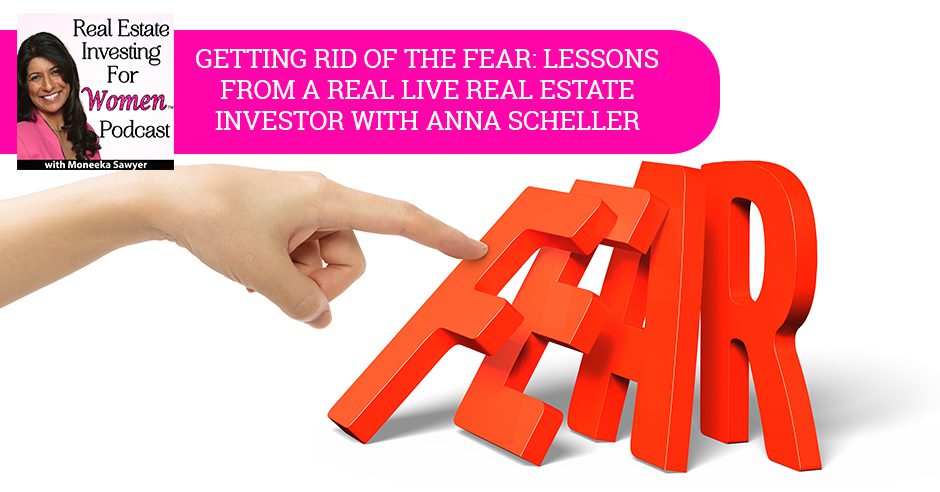
A lot of people are held back from doing what they love doing or pursuing their passions because of fear. Sometimes, it’s the fear of uncertainty, of change, or failure. For business owner and real estate investor Anna Scheller, it was the fear of objection and stepping out to do something she wasn’t sure she could pull off. Anna leads the corporate housing industry in South Central Texas. On today’s show, she chats with Moneeka Sawyer about how she overcame her fear which led to opening up more doors for her corporate housing company. Don’t miss these golden nuggets from a real live real estate investor!
—
Listen to the podcast here
Getting Rid Of The Fear: Lessons From A Real Live Real Estate Investor With Anna Scheller
Real Estate Investing For Women
I am excited to welcome into the show my friend, Anna Scheller. Anna is an award-winning podcaster, speaker and TV show host. She coaches entrepreneurs to develop strategies that result in more sales for their businesses while creating profit for future growth. She began her business career as a real estate investor, which is why she’s on the show, and has learned many lessons as a result. She is the Executive Member and Founder of Capri Temporary Housing, and still actively invests in real estate, albeit with more experience. She co-hosts the Black Belt Selling with her daughter Stephanie and has her own show, Sales Mastery, which airs on iTunes and Roku TV. Why Black Belt Selling? Anna just achieved her fourth-degree black belt in Taekwondo at the age of 58. Anna is the mother of seven children, is married to Phillip Scheller, and they live in Del Rio, Texas. Anna, welcome to the show.
Moneeka, I’m looking forward to being on your show. Thank you so much for inviting me.
It’s my pleasure. This is going to be fun. You and I have only talked about investing. Tell us a little bit about this other company that you’re running.
It came out of the real estate investing situation. It could be a very long story, but the short version is we started buying properties and we ended up with a fourplex in the midst of all of that. Someone had come to me when we had the fourplex and said, “What would you charge me to furnish it?” I gave him the price and he goes, “No, I can do it for cheaper, but I still want to rent from you,” which sparked the idea of, “I wonder if there’s a market for this.” In that fourplex, as people started to leave, I set up one apartment for furnished, just furnishing it. I can go into more detail later about how that ended up working out, but that started the temporary housing business. We hit a place where we were doing extremely well and we rapidly grew.
We went from 8 units up to 30 units in a space of three months, which is rapid growth. It was hard and difficult. I wasn’t prepared for it. Hence, some of the fun little mistakes I made. What ended up happening when that market changed, because it was very much government-driven and there was a change in administration, that market dried up. The problem was I didn’t know how to find more people who needed what I was providing. That sent me on a search to figure out what I needed to do. I had very little marketing experience. I didn’t have any sales training. I felt very lost. The following year, I ended up getting sales training and discovered that I was afraid of objections, which was what was holding me back.
Corporate housing is a pricey item. I was afraid that people would say, “That’s too expensive,” or they would personally attack your price kind of situation. When I was going through that training, using that training opened up more doors for the corporate housing company. I was so excited about the training. I started telling people how to sell and my trainer at the time, Eric Lofholm, invited me to become one of his trainers and sell his program. That’s how I ended up in sales training. My daughter came on board. She went through his program, and then she and I started the podcast Black Belt Selling. Everything’s morphed to where I am doing both. I am doing the coaching and the podcasting, as well as the corporate housing.
Mistakes happen, and it's okay. Share on XThey work well together. I stay in the sales training space because like everybody, I need to be reminded of the things I should be doing. You can get so complacent to where you get a flood of people coming in and you think that’s going to be your bread and butter for a while. Suddenly, you’re not working on your sales process. Before you know it, you don’t have any more clients. That’s whether you’re a real estate investor, whether you are renting properties or whatever you’re doing.
I think that’s true. Our place where we need real reminders is a great place to focus even a portion of our daily work. I grew up in a place where I was bullied, tormented, and became a very depressed person. Bliss has been my journey my whole life. Part of why I continue to focus on it is for that daily reminder that this is important for me. I need to continue to work my skills. I’m a blissful person now. There are times when I fall off the wagon and I stopped doing my practices. I realized that I’m not as happy and not as blissful as I normally am when it continues to be a part of the things that I’m focusing on through my day. This show helps me to keep that focus so that I can stay more blissful. This show serves me in many ways. I love that it serves many women, but part of it is that it reminds me of what’s important for me too and keeps me focused on that. I totally get that.
I was sharing with you a story that was a costly story. Thankfully, not as costly as it could have been. As I was getting ready for the podcast, I kept thinking to myself, “I’m doing this for the good of my family. I’m doing this because it’s fun.” The situation’s not fun, but there’s bliss to be found. There’s joy to be found even in that situation. The fact that I only lost $500 and not $2,100. Those are the kinds of things where I thought, there’s real truth in choosing to be joyful because stuff’s going to happen every day. Are you going to let it pull you down or are you going to look at it, see the lesson you can pull from it, and move forward? That is also a journey that I’ve had to take through my investing years as well.
I love how you say that because it is a choice. My book is called Choose Bliss. It doesn’t mean that challenges don’t come up. It doesn’t mean that you don’t have bad days. It doesn’t mean that you don’t fall off the wagon. It doesn’t mean that you get depressed or angry or whatever. Life is still happening, but if your focus is on living a blissful life and that’s your priority, then you develop the skills to continue to come back to that place. Over time, as you practice, it gets easier and easier. It becomes your default. You are able to rise back to that so much more blissfully and easily rather than it being work. When life tries to pull you down, you’re able to pull yourself back up and the people you love also. Thank you for that. Let’s back up a little bit. Talk to us about how you got started.
It’s one of those funny, merry stories if I might say so. A friend of my husband’s and mine gave us this book and said, “You guys need to read it.” My husband wasn’t into that stuff. I was probably 6 or 7 months pregnant with our seventh child. I bought the book and started reading it in bed. We had been investing in other things. We had invested in mortgage securities. We had that situation going. My husband was looking at how he could do the stock market. Investing wasn’t something new, particularly to him. He would come to me and say, “What do you think about this?” I didn’t know squat. I was thinking, “You’re the smart one. Make a decision.” I let him pretty much make most of the decisions. I’m reading this book. We’ve never invested in real estate.
We bought a couple of homes. We have about three homes and we’d never invested in real estate beyond our own homestead. Rich Dad Poor Dad talks about the absolute benefit of real estate investing. We’re both in bed reading our separate books and I’ve got a little bit of a belly and I’ve got a kid kicking me in the meantime. I’m reading this book and I said, “What do you think about real estate investing, honey?” He goes, “It’s too risky.” I go, “Okay.” I put the book down. I continued to read the book, but now I’m thinking. I don’t remember saying anything to him about it again. Two years later, he picks up the book and in picking up the book, he goes over to me. We’re reading our books. Our baby now is two years old. He looked at me and he goes, “What do you think about investing in real estate?” “I think that’s a great idea.”
We actively started looking for real estate. Robert Kiyosaki at that time had a real estate investing school seminar type of thing. It was a three-day event in Scottsdale. We paid all the money. I think we spent about $15,000 by the fees and then staying in the posh hotel and eating out and doing all these things that we were like, “This will be cool to make this happen.” Right after that, I had spotted a property. By what I do now, I wouldn’t say it was a bargain back then, but to us, it was a bargain. We invested in that property. That was a three-bedroom, two-bath house with a two-car garage. We still own that property now.

Real Estate Investing Lessons: Things happen all the time. Are you going to let them pull you down, or are you going to see the lesson you can pull from it and move forward?
I’ll be honest with you, it has probably been the steadiest rental property we’ve ever owned. As a matter of fact, I was talking to my husband about selling it so we could pull the equity out and start investing in bigger things. He’s like, “Why would we do that? We make so much money.” I’m laughing going, “There’s so much more money to be made. Stop it.” That’s how we got into real estate investing. That was probably our biggest success story. We bought the house for $95,000. If I sold it now, I could sell it for easily $160,000. We’ve owned it for about sixteen years.
You started getting into multifamily. Tell us a little bit about that journey.
All of the books tell you, you should get a mentor. We got a mentor and I spotted this fourplex, but I wasn’t ready to step out. I was looking at single-family homes. By this point, we had picked up two more single-family homes by the time we saw this quad. I mentioned it to the mentor and the mentor said, “Go for it. You need to get it.” I’m like, “No. I don’t think so.” He took us through the steps to start negotiating for the property. This property was not a great bargain, but the potential cashflow is good. What ended up happening was by the time we got around to putting the offer in, another offer had gone in. We were the backup. We were encouraged by the realtor to put in the offer. I guess realtors must talk. She said, “This one looks shaky. It looks like they’re not going to be able to pull this off.” Sure enough, their offer fell through and ours came up on the table next.
Up until this point too, we’d also done some spec homes. We built some homes and sold them. We had a little bit of cash. We also had some prop land that we had purchased. Our portfolio for beginners, we were doing okay. We ended up with this fourplex and that was our first fourplex. We went on to pick up another fourplex maybe a couple of years later when we were able to start getting the furnished housing underway. We picked up a couple of duplexes. We’ve since sold all of those properties. I’ll share some of our fun little mistakes in that. The thing that we did was we took the steps anyway. I’ll be honest, I was scared. I was afraid of stepping out and doing something that I wasn’t sure I could pull off because I knew my own tendency to drawback when I was talking to people. I knew my tendency to let people go when they offered objections to renting from us. It was too high. It was this, it was that. I was scared and yet it turned out to be a big turning point in our business. It was there that opened up to us the corporate housing, which is the ongoing business that we have now. If it wasn’t for that, I would not be doing what I’m doing.
Tell us a little bit about the evolution and some of the mistakes that you made. I’m not trying to put you on the spot, but I want the ladies to know that mistakes happen and it’s okay. We can do things in spite of our fear and be successful. We can make mistakes and be successful. I’ve had people in the show that built a business, lost everything in the 2008 crash and have built multimillion-dollar businesses since then. Part of what you and I had talked about before is that there was a lot of these moments of fear that you had to step through.
There were a lot of mistakes that you made that you had to say, “I need to learn from this and move on instead of giving up.” The thing is that if you make a mistake and you stop, then you stopped at the mistake. It’s counterintuitive. If you make a mistake and you move, then you didn’t stop at the mistake. Now you get to experience success. This is one of those things that you’ve done very well. Not that you’ve made a lot of mistakes, but when you make the mistakes, you’re able to move through it. That’s the conversation that I’m interested in having.
You can't always pick the people who are going to be supportive and help you through a mistake. Share on XI was so eager to buy the property. I think this is very common among early investors. I was eager to start scooping up the property. I would drive-by something and I’d go, “I think we should get that.” My poor husband, I was driving him crazy. There was this one I did. There was this one property that was being sold by a pastor and his wife. They’d moved on and they were trying to sell it. At the time it was $96,000, but for us to buy it was going to cost us. It wasn’t even the normal cost. We were going to have to pull money from somewhere else to do this and that. We paid to sell the property to us.
I can’t remember how it worked, but I remember my husband thinking, “You’re screwing up, Anna.” I’m like, “No. It’s all going to work out.” We had that property and sold that in 2020. We purchased it in 2007 and that property ended up becoming a money pit. The mistakes I made to the property were number one, I didn’t sit down and I didn’t look at what was a realistic rent that we could get for that property. We weren’t looking at it as a flip. We were looking at it as a rental. There are two ways to invest in real estate. One is that you can do the buy and hold. You turn it, you flip it, you buy something needs repairing or has cosmetic issues. You turn it around and then you sell it for profit.
This particular property, I didn’t do good due diligence. I tried to force my husband into taking it because I wanted it that bad. Initially, we were able to get a good rent on it, but because I wasn’t conscious of the location, I wasn’t conscious of what other rents in that area would be. It got to the point that I was starting to get desperate for tenants. Often, I rented the property out at the cost of the mortgage insurance and taxes. If something went wrong with the property, there was no money there. When things would go wrong, I’d have to take money from other properties to take care of this one.
Ultimately in the end, with the last tenants we had, we’re always paying their rent. I should have kicked them out months before we finally were able to move them. It turned out that the property had so many problems. We were expecting a $30,000 profit. I think we ended up with $15,000, which is still good. I’m not complaining, but here’s the thing. I didn’t judge character well because I allowed my desperation to make sure that the property was filled. I compromised a lot of the things that I shouldn’t have. I compromised making sure that the tenants had good background. I compromised with the rents and it ended up being a huge other valuable lessons that I’m taking with me now as I do more investing and work to grow our portfolio some more. When you look at that, especially if you have a disagreement with a spouse or a significant other, that can erode your confidence at recovering from a mistake.
If I can encourage your readers, here’s the thing to keep in mind is that you can’t always pick the people who are going to be supportive and help you through a mistake. I hope you can. If you can’t, then we’ll be talking about practices that can help you. The bottom line is that when you fail, you have to get up and you have to keep moving forward. Yes, that property was a problem. I may get another problem property. If I do, I will handle it differently, but we’re moving forward. You make a mistake, you dust yourself off. That’s where mentors and support system come in. You get people around you who can help you go back to the experience. See where things could have been done better, could have been maybe smoother or you could have avoided certain mistakes. You implement those things the next time around. Quitting doesn’t give you the opportunity to try again. Surround yourself with people who are going to help you analyze what you need to do different so that you can pick yourself up and start over again.
Were there any decisions that you regret?
There’s a lot. I’m sure I’ve made a lot of poor decisions that other people have made. With the corporate housing business, we learned about a model where we could grow our inventory quickly without having to go through the process of purchasing. We did a lot of subleasing and that’s still part of our model. It’s a great model. However, the challenge that I ran into was that I was so excited with this. Remember I said earlier that that business grew and multiplied rapidly? I didn’t have the infrastructure in place to manage the funds. You’ve heard the saying, “Easy come, easy go.” That’s what happened. I didn’t have the experience and I didn’t have a team helping me to manage the situation. I can’t tell you how many thousands of dollars I have lost from not working with a team.

Real Estate Investing Lessons: There are two ways to invest in real estate. One is to do the buy-and-hold you and keep it, or buy something that needs repairing, turn it around and then sell it for profit.
One such situation that happened was that when the market was booming, we had the Eagle Ford Shale, the fracking that was going on here in South Texas. What I did is I took out a number of apartments expecting to fill them. Saudi said, “We’re not going to have any of this,” and they glutted the market with oil. Overnight, those jobs disappeared. Overnight, my market disappeared, but I had all this inventory that I had taken out to satisfy a need that was no longer there. I would sit here in this office and I would weep because I didn’t know how I was going to solve this problem. My husband was upset. He didn’t help. He was trying to be supportive and understand, but he was also scared.
He wasn’t as involved in the business as I am still. I use him a lot for bouncing decisions off of him now. Back then, all I kept seeing was $10,000 draining out of my already impoverished bank account. I decided I wasn’t going to break those leases because breaking leases usually ends up costing you three months of rent. Why not keep the leases and at least try to get them filled, even if it was at cost? That was a three-month period of a lot of misery and pain. That is a decision I terribly regret, but I was working with a guy at the time and he said, “I want you to know, Anna, no matter what happens in your business, you’re still valuable.”
I felt so inadequate. I felt so foolish. I felt like my value was what was in my bank account. This guy helped me to realize that I brought the value in and that the bank account would recover. I had to borrow money. I had to take funds. I had to do things that I’ve told myself I would never do. It wasn’t illegal. No cartels. Taking out inventory, not staying in tune with the culture to know what was coming down. There are two things that are good news. One, there was another company that did the exact same thing, except they were bigger. They were losing more money than I was. I wasn’t the only one.
Second is that it became an extremely valuable lesson. It was a lesson in humility to realize that I was subject to making decisions that had consequences I didn’t want to deal with. I think that’s also a life lesson because the more you do, the more mistakes you’re liable to make. You have to accept the fact that those mistakes are going to come. While you want to mitigate loss to the very best you can, you have to go out and you have to keep doing what you’re doing. I’m successful now because I didn’t quit. I’m successful now because I found the means to take care of the problems. My credit score suffered for a while there, and that’s something I’m still recovering from. On the other hand, we’re still standing and we now have multiple opportunities in front of us to grow our business. Would that have happened if I quit? Absolutely not.
Tell us about your biggest triumph.
It was in adopting that business model that helped me grow the company because that has been something that has helped me throughout my years. Another big triumph is I hired a consulting team that I’m working with right now, helping me to grow the business. Those two things plus having seven kids.
Quitting doesn't give you the opportunity to try again. Share on XDo you mind giving us a little bit of what’s that business model that you adopted?
It’s the whole idea of subleasing. Your client leases the same way you’re leasing. For example, you go into an apartment community. Let’s say I have somebody that comes to me and they have a team of ten people that they need to house. We researched partner communities in the location that can do that work. Depending on the requirements, we’ll find how we can get that many people. If they want to double bunk them, if they want to give them each their own apartment. We look to see what’s available. The other thing you have to do is there’s several pieces to it. One is you have to arrange for furniture rental or purchase the furniture yourself. I’m bringing in linens, housewares, and all of that good stuff because essentially you want to set it up like a fully furnished and full service house.
You set up the electrics, the cable, the utilities, everything, and then you put that together. You figure out how much money you need to make on top of that for your company and yourself. You present that to the client and they have a decision to make. I like working with companies because they understand the value. Working with individuals is a little tougher because a lot of times, they’re trying to save money over a hotel. We’re often comparable to a hotel in terms of price, but we’re not always saving the money because what we offer is so much more space. We can do a lot of things price-wise comparable to a hotel. That’s the model. You go in and you sublease. You set everything up and then you’re managing it for your client, whether it’s a company or an individual.
You go in and you lease something first and then you sublease that to your client. Is that what you’re doing?
Correct.
You don’t own the properties?
Not all of them. I had some that I owned like those fourplexes. Those were all set up fully furnished apartments. We sold them as fully furnished, which was able to get us good profit on the sale of the property. We also created a little bit of competition here for us, but because we’re so unique and we’re so specialized, I don’t worry about that. The Airbnbs don’t frighten me.

Real Estate Investing Lessons: You’re going to be a better investor if you take care of yourself and step back when you need to.
I know in EXTRA, we’re going to do a deeper dive. We’re going to talk a little bit about how you were sabotaging yourself and what you learned about that. We’re also going to talk about a scary time when you were losing $10,000 a month and how you pulled yourself out of that. That’s what we’re going to cover int EXTRA. I’m excited about that conversation because I know there have been many people that have been through it. First of all, frequently we self-sabotage because of our own fears. The other piece is I know most real estate investors have been through a time where they were like, “How am I going to make it?” I’m excited to hear your story about what happened around that. Could you tell everybody how they can reach you, Anna?
If you want to get in touch with me personally, I would go to my AnnaScheller.com website. I’m still very active in the sales training space. I would love to have a conversation with you about how you’re approaching your investing because everything is a sale. You can go there and you can download my ten sales tips on how to close more sales. You can also get on my calendar. We can have a fun conversation and I can learn more about you and possibly learn more about me. There’s always a lot to learn, isn’t there? Go to AnnaScheller.com. Go ahead and download that. It’ll pop right up for you. I follow all the little guru rules about doing that stuff, but I would love to have a conversation with your readers and see how I might be able to help them close more sales, make more deals because sales is all about the deal and I love the deal and you will too.
Thank you so much for that. Thank you for the free gift. Are you ready for our three rapid-fire questions?
I’m ready.
Anna, tell us one super tip on getting started investing in real estate.
Do it anyway. You’re going to be scared. Just do it. Take the time to make sure that you can, but here’s the thing. This is something I’m being encouraged to do. Don’t be afraid to put out multiple offers. Here’s why. You can make sure that you’ve got conditions to where you don’t have to follow through if something doesn’t happen. If you wait for all the conditions to be right, then you’re going to limit what you can do in the marketplace. Whether you’re putting out 1, 2 or 10 offers a week, go ahead and do it because the means to accomplish it will come as you move forward.
What is one strategy on being successful in real estate investing?
I think one of the most successful things I did was starting to take care of myself. It can be so urgent that you’re so busy taking care of this and that, and doing all this stuff that at the end of the day, your mind is spinning. What happens is you can work that way for a little while, but you have to take the time to get your exercise, get your sleep, have your meditation, quiet time, however you spend that time. Eat properly and make sure that you’re taking care of yourself and your family because in the end, they’re the ones you’re serving, not the person who’s going to buy the real estate or not the renter who’s going to rent it. Ultimately, it’s for the personal goals that you have. You’re going to be a better investor if you are taking care of yourself, and stepping back when you need to and breathing. Take care of yourself. That’s the most important person you have that’s going to run the deals and meet your goals, whether things go well or things require some creative problem-solving thinking.
That leads us into the next question which is, what is one specific daily practice that you do that contributes to your personal success?
If you wait for all the conditions to be right, you will limit what you can do in the marketplace. Share on XI would say that it is my quiet time. It’s a place to pray and to ask God for wisdom. When I feel like things are spinning out of control, God is always so faithful to help me if I will take the time to speak to Him, to read His word. Those are the things that I think the most paramount to my success because He promises never to leave me or forsake me. The ultimate mentor and support system is God Himself. There are other things I do, but that’s the bedrock of my life.
Thank you so much for sharing that.
You’re welcome.
This has been wonderful. I can’t wait until we chat more in EXTRA. In EXTRA, we’re going to be talking about how Anna got through a tough time where she was losing $10,000 a month and what she did to pull out of that. Also, what you learned about how she was self-sabotaging her own business and how she pulled herself out of that too. We’re going to be talking about that at EXTRA. If you are already subscribed, we’ve got a lot more for you. If you’re not, but you would like to be, go to RealEstateInvestingForWomenExtra.com. You get the first seven days for free. You can get this EXTRA and as many as you can in the first seven days for free, and then you can decide. If it’s for you, you stay subscribed. If it’s not, nothing lost. You get a lot of juicy content. Thank you so much for joining us for this portion of the show. I look forward to seeing you next time. Until then, always remember, goals without action are just dreams. Get out there, take action and create the life your heart deeply desires. I’ll see you soon.
Important Links
- Capri Temporary Housing
- Black Belt Selling
- Sales Mastery
- Choose Bliss
- Rich Dad Poor Dad
- AnnaScheller.com
Special Code: moneeka
About Anna Scheller
 I am a dynamic Keynote Speaker with a heart to help people create more sales. As an educator for over 20 years, I have the skills to provide learning in a fresh and engaging perspective.
I am a dynamic Keynote Speaker with a heart to help people create more sales. As an educator for over 20 years, I have the skills to provide learning in a fresh and engaging perspective.
I have a unique style that combines sales with training. As a 3rd degree black belt in TaeKwonDo, I combine the black belt mindset with sales training to provide engaging and thought-provoking training.
Every month I lead a free sales training workshop and I attend regular keynote speaker events to help sales professionals expand their network and practice sales skills in a safe environment. My passion as a sales trainer is to empower people to elevate their results and realize their significant contribution to life. Among others, I have spoken to dealerships, financial institutions, as well as leadership classes for the local Chamber of Commerce. I am currently conducting sales training workshops for the Small Business Development Centre for Rio Grande College along the Texas-Mexico Border, as well as conducting webinars for clients all over the world. My passion is fueled by experiencing the change in my own businesses as a result of investment in professional sales training. In one year, I increased the revenues in my corporate housing business 50% and doubled the volume in my network marketing business. I am available for free motivational talks to any size organization.
Moneeka Sawyer is often described as one of the most blissful people you will ever meet. She has been investing in Real Estate for over 20 years, so has been through all the different cycles of the market. Still, she has turned $10,000 into over $5,000,000, working only 5-10 hours per MONTH with very little stress.
While building her multi-million dollar business, she has traveled to over 55 countries, dances every single day, supports causes that are important to her, and spends lots of time with her husband of over 20 years.
She is the international best-selling author of the multiple award-winning books “Choose Bliss: The Power and Practice of Joy and Contentment” and “Real Estate Investing for Women: Expert Conversations to Increase Wealth and Happiness the Blissful Way.”
Moneeka has been featured on stages including Carnegie Hall and Nasdaq, radio, podcasts such as Achieve Your Goals with Hal Elrod, and TV stations including ABC, CBS, FOX, and the CW, impacting over 150 million people.

